“For God so loved the world, that He gave His only begotten Son, that whoever believes in Him shall not perish, but have eternal life. For God did not send the Son into the world to judge the world, but that the world might be saved through Him." (John 3:16-17)
This lesson is the second in the series on "Christians and the World." This lesson focuses on God's offer of salvation and eternal life to the world through Christ.
Consider. Have you heard of God's offer of salvation and eternal life through his Son Jesus Christ? Have you accepted God's offer?
What is God's Offer?
God offers the world salvation and eternal life through his Son Jesus. John 3:16-17 tells us, "For God so loved the world, that He gave His only begotten Son, that whoever believes in Him shall not perish, but have eternal life. For God did not send the Son into the world to judge the world, but that the world might be saved through Him."
To Whom Does God Make the Offer?
God offers salvation and eternal life to all the people of the world. There are no exclusions. There is no "asterisk." There is no asterisk that says you are excluded from God's offer because you are * (fill in the asterisk). The Apostle Paul wrote that God "desires all people to be saved and to come to the knowledge of the truth" (1 Timothy 2:3-4). God's offer is available to you.
Even though God has made salvation and eternal life available to the world, not all people will be saved. Some people hear God's offer and reject it. Some people have not heard the gospel message; however, they reject what God has revealed to them already through the creation. "That which is known about God is evident within them; for God made it evident to them. For since the creation of the world His invisible attributes, His eternal power and divine nature, have been clearly seen, being understood through what has been made, so that they are without excuse" (Romans 1:19-20). God has promised that all who seek him will find him (Deuteronomy 4:29). Why Does God Make the Offer of Salvation and Eternal Life?
Because God loves the world. God loves all the inhabitants of the world including people who do not know and love Christ and people who are hostile to Christ (John 3:16, Ref. 2).
God sent his Son Jesus because of God's divine love for the world. Even though mankind has sinned against God, disobeyed God, and turned away from God, God still has loved us. The Apostle Paul wrote, "But God demonstrates His own love toward us, in that while we were yet sinners, Christ died for us" (Romans 5:8). John, Jesus' disciple, wrote, "In this is love, not that we loved God, but that He loved us and sent His Son to be the propitiation for our sins" (1 John 4:10). The word, propitiation, means atoning sacrifice (Ref. 3). Why is God's Offer of Salvation and Eternal Life Necessary?
Because through Adam, sin has come into the world and infects all people. Romans 5:12 tells us, "Therefore, just as through one man sin entered into the world, and death through sin, and so death spread to all men, because all sinned." Without the treatment of Christ, the infectious disease of sin is fatal. That is why we need a Savior.
What is the Salvation that God Offers?
John 3:17 tells us, "For God did not send the Son into the world to judge the world, but that the world might be saved through Him." The Greek word for saved in John 3:17 is sózó. Sózó means deliver out of danger and into safety; used principally of God rescuing believers from the penalty and power of sin – and into His provisions (safety) (Ref. 4). Ref. 5 defines salvation as "The deliverance, by the grace of God, from eternal punishment for sin which is granted to those who accept by faith God’s conditions of repentance and faith in the Lord Jesus."
What is the Eternal Life that God Offers?
Eternal life is a free gift of God to those who believe in Jesus Christ (Romans 6:23). Eternal life begins when we put our faith in Jesus. As believers in Christ, eternal life continues with God after our physical death (John 11:25-26). Eternal life is the quality of life that results when we know Jesus Christ by experience, on a first-hand basis (John 17:3). For further information about eternal life, refer to "What is Eternal Life?" (Ref. 6)
What is the Role of Jesus Christ in God's Offer?
God sent His Son Jesus to give his life sacrificially to pay the penalty for our sin. "And according to the Law, one may almost say, all things are cleansed with blood, and without shedding of blood there is no forgiveness" (Hebrews 9:22). By paying the penalty for our sin with his life blood, Jesus has redeemed those who believe in (trust in and have faith in) him. The Apostle Peter wrote, "You were not redeemed with perishable things like silver or gold from your futile way of life inherited from your forefathers, but with precious blood, as of a lamb unblemished and spotless, the blood of Christ" (1 Peter 1:18-19).
God's Offer of Salvation and Eternal Life is Conditional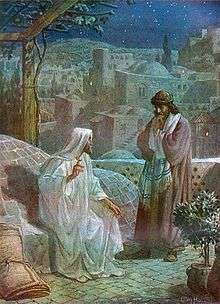 Jesus and Nicodemus (Ref. 7) Jesus and Nicodemus (Ref. 7)
Even though God unconditionally loves the world, there is one condition that God stipulates for mankind to accept his offer of salvation and eternal life - believing in (trusting in, having faith in) his Son Jesus. Jesus said to Nicodemus, "For God so loved the world, that He gave His only begotten Son, that whoever believes in Him shall not perish, but have eternal life" (John 3:16, John 3:1-2).
Is there a Penalty for Rejecting God's Offer?
Yes. The Bible tells us, "For God did not send the Son into the world to judge the world, but that the world might be saved through Him. He who believes in Him is not judged; he who does not believe has been judged already, because he has not believed in the name of the only begotten Son of God" (John 3:17-18). Jesus also stated, "Truly, truly, I say to you, he who hears My word, and believes Him who sent Me, has eternal life, and does not come into judgment, but has passed out of death into life" (John 5:24).
Why is God's Offer the Most Important Offer You Will Ever Receive?
Unlike what the world offers, God's offer of salvation and eternal life results in eternal life-giving benefits when you accept God's offer by believing in Jesus.
Apply. God offers you salvation and eternal life through his Son, Jesus Christ (John 3:16-17). Have you already accepted the most important offer that you will ever receive? If yes, then praise God. If not, will you accept God's offer by thanking Jesus for forgiving your sins and then fully trusting in him by faith today?
Related Lessons
"What Does 'To Be Saved" Mean in the Old Testament?" (Psalm 18:3) "What Does 'To Be Saved' Mean in the New Testament?" (Acts 16:31) "What is Eternal Life?" (John 17:3) "Biblical Definition of the World" (John 1:10)
References
1. Ref.1 begins on the next line https://americanart.si.edu/artwork/study-christ-and-nicodemus-rooftop-23686 2. http://www.ScriptureWay.com/home/biblical-definition-of-the-world 3. https://biblehub.com/greek/2434.htm 4. https://biblehub.com/greek/4982.htm 5. https://www.gotquestions.org/Christian-doctrine-salvation.html 6. http://www.ScriptureWay.com/home/what-is-eternal-life 7. https://en.wikipedia.org/wiki/Nicodemus
3 Comments
Updated 3 July 2024
Photo source: FreeBibleImages.org
"Jesus said to her, 'I am the resurrection and the life; he who believes in Me will live even if he dies, and everyone who lives and believes in Me will never die. Do you believe this?' " (John 11:25-26)
Consider. Do you believe in Jesus, and do you believe that you will live in him even after your physical death?
This lesson discusses Job's question, "If a man dies, will he live again?," (Job 14:14), and Jesus' answer, "I am the resurrection and the life; he who believes in Me will live even if he dies" (John 11:25).
The scriptures quoted in this lesson are from the New American Standard Bible, 1995 version, unless noted otherwise (Ref. 1).
Job's Question - "If a man dies, will he live again?"
Job asked, "If a man dies, will he live again? All the days of my struggle I will wait until my change comes" (Job 14:14). Job looked forward to a future time when he would be changed and revived from death. The Hebrew word for change in Job 14:14 is chaliphah (pronounced as khal-ee-faw'). Chaliphah means a change of garments (Genesis 45:21-22) as well as revival after death (Job 14:14, Ref. 2).
Job also believed that in a future time in the flesh he would see God. "As for me, I know that my Redeemer lives, and at the last He will take His stand on the earth. Even after my skin is destroyed, Yet from my flesh I shall see God" (Job 19:25-26). Jesus' Answer - "I Am the Resurrection and the Life"
John, the disciple of Jesus, wrote in John 11:1-5 about Jesus receiving news his friend Lazarus was sick. Jesus waited two more days (John 11:6), and then he took his disciples to Bethany, the village of Mary, Martha, and Lazarus (John 11:1). Jesus knew before he traveled to Bethany that Lazarus already was dead (John 11:14).
When Jesus came to Bethany, Martha came out to meet him (John 11:20). Martha said to Jesus, "Lord, if You had been here, my brother would not have died" (John 11:21). Jesus assured her, "Your brother will rise again" (John 11:23). Martha replied to Jesus, "I know that he will rise again in the resurrection on the last day" (John 11:24). The Greek word for resurrection in John 11:24-25 is anastasis (pronounced as an-as'-tas-is), which means standing up again, referring to physical resurrection of the body (Ref. 3). Note that Martha believed in a resurrection - as a future event. Believe in Jesus - Receive Eternal Life
Jesus then turned his discussion with Martha to the present. Jesus told Martha, and these words assure us today -- "I am the resurrection and the life; he who believes in Me will live even if he dies, and everyone who lives and believes in Me will never die. Do you believe this?" (John 11:25-26).
Job's question was, "If a man dies, will he live again?" (Job 14:14). Jesus answered Job's question in the affirmative (yes) and with a promise. Jesus' promise is that when you believe in (trust in, have faith in) him you will live even after your physical death (Ref. 4). Jesus is referring to the eternal life of our soul and spirit which begins during this earthly life when we believe in him, and that eternal life continues with Jesus after our physical death ("What is Eternal Life"- Ref. 5).
Apply. Jesus said to Martha, "I am the resurrection and the life; he who believes in Me will live even if he dies, and everyone who lives and believes in Me will never die" (John 11:25-26). Then Jesus asked Martha, "Do you believe this?" ... (pause) Do you believe this?
Related Lessons and Resources
"What is Eternal Life?" (John 17:3) "Bible Verses About Eternal Life" "Made Alive Together with Christ - A New Quality of Life" (Ephesians 2:45) "Paradise, Jesus, and the Penitent Thief" (Luke 23:42-43)
Photo source: FreeBibleImages.org
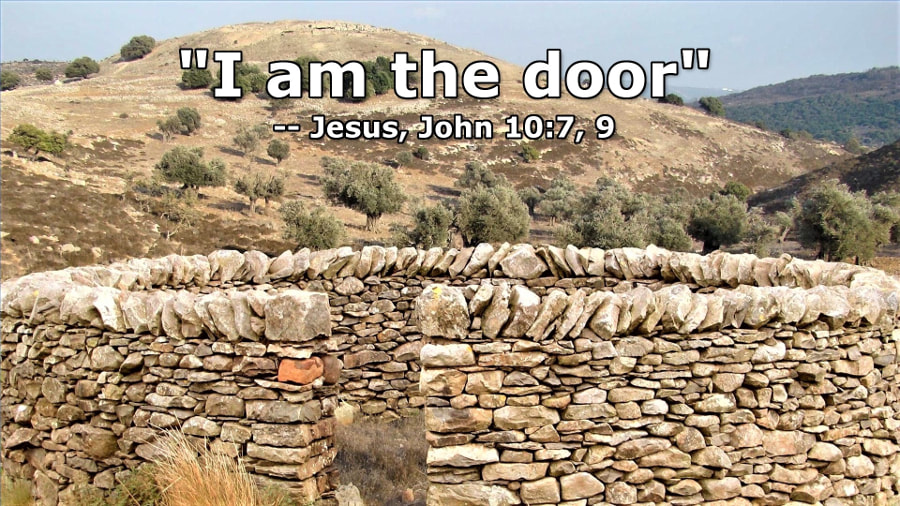
Permanent Sheepfold Enclosure - Holy Land. Photo Copyright David Padfield. Used under license. Permanent sheepfolds were built on the sunny side of valleys where there is protection from cold winds. These had stone walls, 4-5ft high and one entrance guarded by the shepherd. Thorns were often put on the top of walls to deter wild animals. Jesus referred to such a sheepfold and to thieves and robbers climbing over the wall (John 10:1-3).
"So Jesus said to them again, 'Truly, truly, I say to you, I am the door of the sheep.' " (John 10:7, Ref. 1)
"I am the door; if anyone enters through Me, he will be saved, and will go in and out and find pasture." (John 10:9)
"Christ is the Door. And what greater security has the church of God than that the Lord Jesus is between it and all its enemies? ... Here are plain directions how to come into the fold; we must come in by Jesus Christ as the Door." -- Matthew Henry (Ref. 2)
This lesson is the third in a series on the "I AM" statements of Christ. This lesson discusses Jesus' "I am the door" statements in John 10:7 and John 10:9.
Consider. Have you entered into the church of God by believing in the Lord Jesus Christ? Are you experiencing spiritual nourishment in Christ? "If anyone enters through Me" - John 10:9
We enter the sheepfold, the church of God, through Jesus Christ (and only through Jesus Christ). Jesus said, "Truly, truly, I say to you, I am the door of the sheep" (John 10:7). We enter that door when we place our faith and trust in Jesus Christ. "As the only proper way of entering the fold was by the door, so the only way of entering the church of God is by believing on him and obeying his commandments" (Ref. 3).
Jesus said, "I am the way, and the truth, and the life; no one comes to the Father but through Me" (John 14:6). "He will be saved"
Once we have entered the door by faith and trust in Jesus Christ, we are saved. Jesus delivers us from perils such as ravenous wolves and false shepherds (Ref. 4, John 10:1-2). Jesus frees us from the power, guilt, and penalty of sin (Romans 8:1-2, Ephesians 2:1-9). Jesus gives us eternal security. Jesus said, "My sheep hear My voice, and I know them, and they follow Me; and I give eternal life to them, and they will never perish; and no one will snatch them out of My hand" (John 10:27-28).
HELPS Word-Studies defines saved as rescued from destruction and brought into divine safety (Ref. 5). "And will go in and out and find pasture"
To go "in and out" is the common Old Testament expression to denote free activity of daily life (Ref. 6). When Moses charged the Israelites at Mount Gerizim to obey the Lord, he said, "Blessed shall you be when you come in, and blessed shall you be when you go out" (Deuteronomy 28:6, Deuteronomy 27:11-12, Deuteronomy 28:1-2). David wrote about the Lord, the Keeper of Israel (Psalm 121:5). David said, "The Lord will guard your going out and your coming in from this time forth and forever" (Psalm 121:8).
Through Jesus (because he is the door), we have security for our daily needs and nourishment for our souls. Under the care of Jesus, we find pasture - food for our souls (Ref. 7). David wrote, "The Lord is my shepherd; I shall not want. He maketh me to lie down in green pastures: he leadeth me beside the still waters" (Psalm 23:1-2 KJV).
Apply. Have you entered the sheepfold of Christ by believing in him? If not, then put your faith and trust in him today. Are you spending time with Jesus daily to receive spiritual nourishment? How can you improve in this area?
References
1. http://www.ScriptureWay.com/home/when-jesus-said-truly-truly-what-did-he-mean 2. https://biblehub.com/commentaries/mhc/john/10.htm 3. https://biblehub.com/commentaries/barnes/john/10.htm 4. https://biblehub.com/commentaries/pulpit/john/10.htm 5. https://biblehub.com/greek/4982.htm 6. https://biblehub.com/commentaries/egt/john/10.htm 7. https://biblehub.com/commentaries/benson/john/10.htm
"Jesus said to them, 'I am the bread of life; he who comes to Me will not hunger, and he who believes in Me will never thirst.' " (John 6:35)
"Christ shows that he is the true Bread; he is to the soul what bread is to the body." -- Matthew Henry (Ref. 1)
This lesson is the second in a series on the "I AM" statements of Christ. This lesson discusses Jesus' statement, "I am the bread of life" (John 6:35).
Consider. Have you come to Jesus, the Source of sustenance and strength for your spiritual life?
God-provided bread from heaven
Jesus' Jewish listeners knew that God had provided bread from heaven (also called "manna") to the Israelites. "Then the Lord said to Moses, 'Behold, I will rain bread from heaven for you; and the people shall go out and gather a day’s portion every day, that I may test them, whether or not they will walk in My instruction' " (Exodus 16:4). The manna that God provided was essential for the Israelite's survival (Exodus 16:35). Note, however, at that time God did not provide the manna universally to all people. Exodus tells us that God provided the manna only for the Israelites, and the manna was temporary (Exodus 16:35). The people who ate the manna eventually died (John 6:49).
"I am the bread of life"
In contrast with the manna that God provided temporarily to the Israelites, Jesus states emphatically, "I am the bread of life."
"He who comes to Me will not hunger, and he who believes in Me will never thirst"
Before the manna could benefit the Israelites, they had to eat it. In the same way, for Christ to provide us spiritual sustenance and eternal life, we must come to him and believe in him. When we come to Christ and believe in Christ, he alone satisfies the hunger and thirst of our souls (Matthew 5:6, John 7:37).
The Samaritan woman at the well responded to Jesus. She said, "Sir, give me this water, so I will not be thirsty nor come all the way here to draw" (John 4:15). The multitude responded to Jesus when he described the bread of heaven (John 6:33). They said, "Lord, always give us this bread" (John 6:34).
Apply. What is your response to Jesus? Will you come to him and believe in him? Come to him, believe in him, and you will receive the bread of life that your soul craves.
"For the word of the cross is foolishness to those who are perishing, but to us who are being saved it is the power of God." (1 Corinthians 1:18)
"Those who receive the gospel, and are enlightened by the Spirit of God, see more of God's wisdom and power in the doctrine of Christ crucified, than in all his other works." -- Matthew Henry (1662-1714) (Ref. 1, Ref. 2)
This lesson describes what the Apostle Paul meant by the phrase, "the word of the cross." God loves us so much that Jesus Christ died on the cross for us, and purchased the forgiveness of our sins. We will also study why for some people, the word of the cross is foolishness and for others, it is the power of God.
Consider. When the Apostle Paul wrote the phrase, "the word of the cross" (1 Corinthians 1:18), what did he mean? In your own words, how would you explain "the word of the cross" to someone else?
Definition of "word." The Greek word for word in 1 Corinthians 1:18 is logos. Logos means something said, a message, reasoning expressed by words, and instruction (Ref. 3). Acts 13:26 and 2 Corinthians 5:19 provide examples where logos is translated as message.
Definition of "cross." The Greek word for cross is staurós. Staurós has both a literal meaning and a figurative meaning. Christ was crucified on a literal Roman cross (Ref. 4). According to HELPS Word-Studies, "Staurós was the crosspiece of a Roman cross; the cross-beam was placed at the top of the vertical member to form a capital 'T' (Ref. 4). "This transverse beam was the one carried by the criminal" (Ref. 4, Matthew 27:31-32, John 19:17). In addition to the shape of a capital "T," researchers also discuss the cross in the shape of a cruciform ("†" or "✚") and as a vertical stake (Ref. 5). Most Christian denominations present the Christian cross in the shape of a cruciform (Ref. 5, Ref. 6).
Staurós also has a figurative meaning. Jesus spoke about the cross each believer bears to be his true follower (Ref. 4, Matthew 10:38, Mark 8:34, Luke 9:23). Thayer's Greek Lexicon describes the figurative cross as an expression used by "those who, on behalf of God's cause, do not hesitate cheerfully and manfully [courageously] to bear persecutions, troubles, distresses — thus recalling the fate of Christ and the spirit in which he encountered it" (Ref. 4, brackets added). What is meant by the expression, "the word of the cross"?
The word, or message, of the cross is that God loves us so much that his Son, Jesus Christ, was crucified and died on the cross for us. Through his sacrifice, Jesus Christ has purchased the forgiveness of our sins. Through Jesus Christ, those who believe in him receive salvation and eternal life.
"But God demonstrates His own love toward us, in that while we were yet sinners, Christ died for us" (Romans 5:8). "For God so loved the world, that He gave His only begotten Son, that whoever believes in Him shall not perish, but have eternal life" (John 3:16). Foolishness to those who are perishing
The Greek word for foolishness is mória. Mória means folly, absurdity, foolishness (Ref. 7). The Greek word for perish is apollumi which means destroy utterly (Ref. 8). HELPS Word-Studies further defines apollumi as "to die, with the implication of ruin and destruction" (Ref. 8).
Why would Paul write that the message of the cross "is foolishness to those who are perishing" in 1 Corinthians 1:18? 1. "To the Jews 'the cross' was the tree of shame and horror; and a crucified person was 'accursed of God' " (Ref. 9, Deuteronomy 21:23). To the Jews, the thought of "a crucified Messiah" seemed "a revolting folly" (Ref. 9). 2. To Paul's Greek audience, the cross was the punishment for slaves and murderers (Ref. 9). The cross meant shame and agony. To the Greeks, worshiping "a crucified malefactor" was superstitious (Ref. 9). 3. Paul explains, "But a natural man does not accept the things of the Spirit of God, for they are foolishness to him; and he cannot understand them, because they are spiritually appraised" (1 Corinthians 2:14). The natural man, who is "not truly enlightened and renewed by the Word and Spirit of God, and therefore has no other way of obtaining knowledge but by his senses and natural understanding … does not understand or apprehend the things of the Spirit of God" (Ref. 10). To us who are being saved it is the power of God
The Greek word for saved is sózó, which means rescued from destruction and brought into divine safety (Ref. 11). The Greek word for power in 1 Corinthians 1:18 is dunamis. Dunamis means (miraculous) power, might, strength (Ref. 12).
The cross is much more than a decoration. "The cross is God's saving power" (Expositor's Greek Testament, Ref. 13). For us who are being saved, the cross is the means by which Jesus has forgiven our sins and rescued us from the path of destruction. By the cross, God offers us the gift of eternal life when we believe in Jesus Christ, God's Son. When we share the "word of the cross" with others, we share not a fable but God's mighty plan for saving people. "For I am not ashamed of the gospel, for it is the power of God for salvation to everyone who believes, to the Jew first and also to the Greek" (Romans 1:16).
Apply. God gives us only two choices. Either we are on the path of perishing or we are on the path of salvation. On which path are you? If you do not know Christ, put your faith in him today, and receive from him forgiveness of your sins and the gift of eternal life. If you do know Christ, thank him for his sacrificial death on the cross to forgive your sins, and for his power working in you each day.
References
1. https://biblehub.com/commentaries/mhc/1_corinthians/1.htm 2. https://en.wikipedia.org/wiki/Matthew_Henry 3. https://biblehub.com/greek/3056.htm 4. https://biblehub.com/greek/4716.htm 5. (Ref. 5 begins on the next line) https://en.wikipedia.org/wiki/Instrument_of_Jesus%27_crucifixion 6. https://en.wikipedia.org/wiki/Christian_cross 7. https://biblehub.com/greek/3472.htm 8. https://biblehub.com/greek/622.htm 9. https://biblehub.com/commentaries/pulpit/1_corinthians/1.htm 10. https://biblehub.com/commentaries/benson/1_corinthians/2.htm 11. https://biblehub.com/greek/4982.htm 12. https://biblehub.com/greek/1411.htm 13. https://biblehub.com/commentaries/egt/1_corinthians/1.htm "Amen, amen I say unto you: He that believeth in me, hath everlasting life." (John 6:47 Douay-Rheims 1899 American Edition (DRA)) "Whenever we read in the text of Scripture our Lord giving a statement that is prefaced by the double 'amen,' it is a time to pay close attention." -- R.C. Sproul (Ref. 1) Consider. When Jesus Christ, the Son of God, began a statement with "Truly, truly," what did he mean? What is special about the expression, "Truly, truly" or "Verily, verily"? As we will see towards the end of the lesson, when Jesus introduced a statement with "Truly, truly," he was calling attention to the importance of the words which follow. Definition. The English words truly, truly are translated from the Greek words amén amén (Ref. 2). American theologian R.C. Sproul referred to these words as the "double amen" (Ref. 1, Ref. 3). The Greek word amén means truly, and is also translated as verily, most assuredly, and so be it (Ref. 2). The Hebrew word amen occurs frequently in the Old Testament and similarly means sure, so be it, and truth (Ref. 4, Deuteronomy 27:15, Nehemiah 8:6, Psalm 41:13). In modern usage, the word amen is typically used at the end of a prayer (Ref. 5). In the New Testament, the writers frequently closed their letters with Amén (Romans 16:27, 2 Timothy 4:22 KJV, 1 Peter 5:14 KJV, 1 John 5:21 KJV, Jude 24-25, Revelation 22:21). "Placing the word amen at the end of a statement is a way of accepting, agreeing, or endorsing what came before" (Ref. 5). Jesus frequently said "Amen" ("Truly") to preface a statement (as compared to saying "Amen" at the end). "Leading off with amen not only implies that what follows is true but also that the person making the statement has firsthand knowledge and authority about it" (Ref. 5, italics added). In the Gospels of Matthew, Mark, and Luke, Jesus used a single Amen (Truly, Verily) to introduce over 50 statements of truth (Ref. 6 below, Strong's Exhaustive Concordance). Consider these references: Matthew 5:18, Matthew 18:12-13, Matthew 25:11-12, Mark 9:41, Mark 11:23, Luke 18:17. To the criminal on the cross who asked Jesus to remember him, Jesus said, "Truly I say to you, today you shall be with Me in Paradise" (Luke 23:43). When Jesus says "Truly, Truly" (double Amen) at the beginning of a statement, he is telling us that the following words are extremely important. When Jesus begins a teaching and says, "Amen, amen, I say to you," our listening ears should be fine-tuned to take note instantly of what our Lord is going to say, for it is of the utmost importance (Ref. 1). Consider the importance of these examples where Jesus introduced his statements with "Truly, truly" (double Amen): John 3:5 - Jesus answered, “Truly, truly, I say to you, unless one is born of water and the Spirit he cannot enter into the kingdom of God. John 5:24 - "Truly, truly, I say to you, he who hears My word, and believes Him who sent Me, has eternal life, and does not come into judgment, but has passed out of death into life." John 6:47 - "Truly, truly, I say to you, he who believes has eternal life." The "Truly, truly" (double Amen) expressions of Jesus occur only in the Gospel of John. In John, Jesus provides 25 statements that begin with "Truly, truly." Click here to see all 25 of Jesus' "Truly, truly" statements. "Whenever we read in the text of Scripture our Lord giving a statement that is prefaced by the double 'amen,' it is a time to pay close attention and be ready to give our response with a double amen to it. He says "amen" to indicate truth; we say it to receive truth and to submit to it." -- R.C. Sproul (Ref. 1) Apply. I encourage you to read (re-read) the 25 "Truly, Truly" Statements of Jesus. For which statements are you most thankful? Which statements are the most challenging? Thank Jesus for his words of truth. References
1. https://www.ligonier.org/blog/what-does-amen-mean/ 2. https://biblehub.com/greek/281.htm 3. https://en.wikipedia.org/wiki/R._C._Sproul 4. https://biblehub.com/hebrew/543.htm 5. https://www.gotquestions.org/verily-verily.html 6. James Strong, "The New Strong's Exhaustive Concordance of the Bible," Thomas Nelson Publishers, 1995 - note, based on the King James Version of the Bible
"This is eternal life, that they may know You, the only true God, and Jesus Christ whom You have sent." (John 17:3)
"Life eternal, then, is not mere conscious and unending existence, but a life of acquaintance with God in Christ." (Jamieson-Fausset-Brown Bible Commentary, Ref. 1)
This lesson describes the biblical definition of eternal life. This lesson primarily uses the Scriptures about eternal life in the Gospel of John. In the next lesson in the series, we will focus on who receives eternal life and how to receive eternal life.
Consider. Think for a moment. How would you define eternal life? How would you explain eternal life to an inquisitive unbeliever, or to a new Christian? For believers in Christ, eternal life certainly includes living with God after our physical death (John 11:25-26). However, the Bible has much more to say about the characteristics of eternal life.
Eternal life is a free gift of God to believers in Jesus Christ.
The Apostle Paul states, "For the wages of sin is death, but the free gift of God is eternal life in Christ Jesus our Lord" (Romans 6:23). In this verse, the Greek word for gift is charisma. Charisma means a gift of grace, an undeserved favor (Ref. 2). Thus, eternal life is not something we deserve or earn. Eternal life is an undeserved gift of God's grace and favor. "In spite of your sanctification as Christians, still you will not have earned eternal life; it is the gift of God’s grace" (Ref. 3).
Jesus said, "My sheep hear My voice, and I know them, and they follow Me; and I give eternal life to them, and they will never perish; and no one will snatch them out of My hand" (John 10:27-28). For the believer, eternal life begins in the present, the here and now.
Jesus described eternal life in the present tense. Thus, eternal life is not just in the future, but is a present possession of the believer which continues into the future.
John 3:36 - "He who believes in the Son has eternal life; but he who does not obey the Son will not see life, but the wrath of God abides on him." John 5:24 - "Truly, truly, I say to you, he who hears My word, and believes Him who sent Me, has eternal life, and does not come into judgment, but has passed out of death into life. John 6:47 - "Truly, truly, I say to you, he who believes has eternal life." In John 5:24, note the importance of hearing Jesus' words. Jesus said, "He who hears My word, and believes Him who sent Me, has eternal life." For believers in Christ, eternal life continues with God after our physical death.
Jesus said to Martha, "I am the resurrection and the life; he who believes in Me will live even if he dies, and everyone who lives and believes in Me will never die. Do you believe this?" (John 11:25-26).
To the thief on the cross who asked Jesus to remember him, Jesus said, "Truly I say to you, today you shall be with Me in Paradise" (Luke 23:42-43). Jesus said to his disciples, "In My Father’s house are many dwelling places; if it were not so, I would have told you; for I go to prepare a place for you. If I go and prepare a place for you, I will come again and receive you to Myself, that where I am, there you may be also" (John 14:2-3). Jesus defined eternal life as knowing God experientially.
"Jesus spoke these things; and lifting up His eyes to heaven, He said, 'Father, the hour has come; glorify Your Son, that the Son may glorify You, even as You gave Him authority over all flesh, that to all whom You have given Him, He may give eternal life. This is eternal life, that they may know You, the only true God, and Jesus Christ whom You have sent" (John 17:1-3).
In John 17:3, the Greek word for know is ginóskó. Ginóskó means to know, especially through personal experience (first-hand acquaintance) (HELPS Word-studies, Ref. 4). Knowing God experientially requires knowing Jesus who is the truth (John 14:6), as well as knowing and living the Word of God on a daily and life-long basis. "This life eternal, then, is not mere conscious and unending existence, but a life of acquaintance with God in Christ" (Ref. 1). Eternal life is a quality of life, not just the duration of life.
The Greek word for eternal is aiónios, which means perpetual, unending, age-long (Strong's Concordance, Ref. 5). Aiónios includes the character of that which lasts for an age, as contrasted with that which is brief and fleeting (Ref. 5). "Aiónios does not focus on the future per se, but rather on the quality of the age it relates to. Thus, believers live in eternal life right now, experiencing this quality of God's life now as a present possession" (Helps Word-studies, Ref. 5).
Summary. Eternal life is a free gift of God to those who believe in Jesus Christ. Eternal life begins when we put our faith in Jesus. As believers in Christ, eternal life continues with God after our physical death. Eternal life is the quality of life that results when we know Jesus Christ by experience, on a first-hand basis.
Apply. Think for a moment. In your own words, how would you describe eternal life? Write down your description of eternal life in a few sentences. What Scripture verse would be your key reference?
Related Lessons
"Paradise, Jesus, and the Penitent Thief" (Luke 23:42-43) "What is the Tree of Life in the Bible?" (Genesis 2:9, Revelation 2:7) "Made Alive Together with Christ - A New Quality of Life" (Ephesians 2:4-5) "Jesus is the Resurrection and the Life (Job's Question, Jesus' Answer)" (Job 14:14, John 11:25-26) |
Daily Bible Verse(Click the link above) AuthorMr. Whitney V. Myers. Christian. For more information, please visit the Author Page. Posting ScheduleI plan to provide new postings about once a month. Planned Topics(subject to change) Recent Posts(most recent three months) Popular Posts(top 10) Categories
All
Archives
July 2024
|
|
Copyright 2018-2024 Whitney V. Myers |
Listed in Feedspot's Top 100 Bible Study Blogs and Websites |
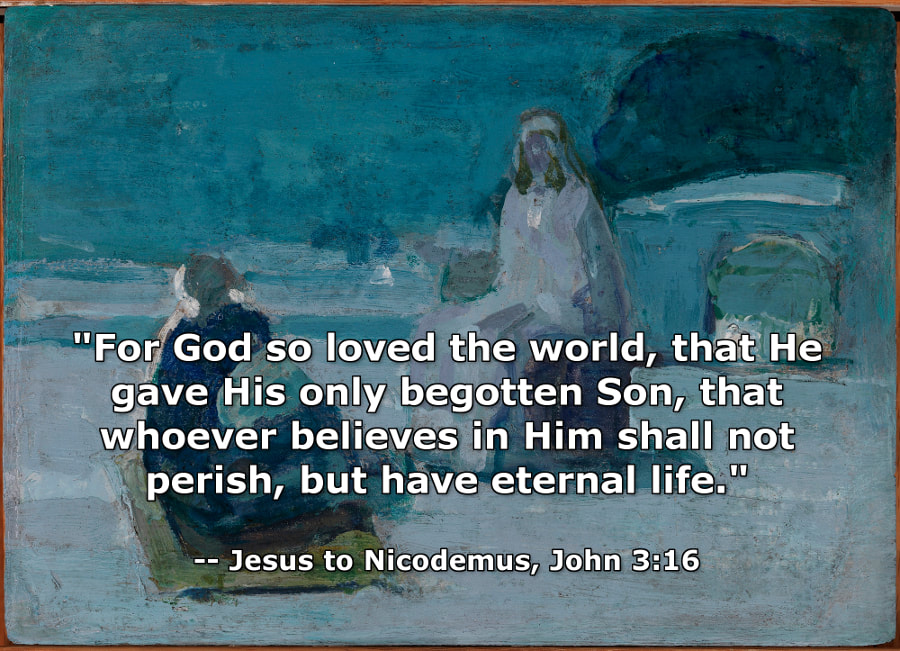
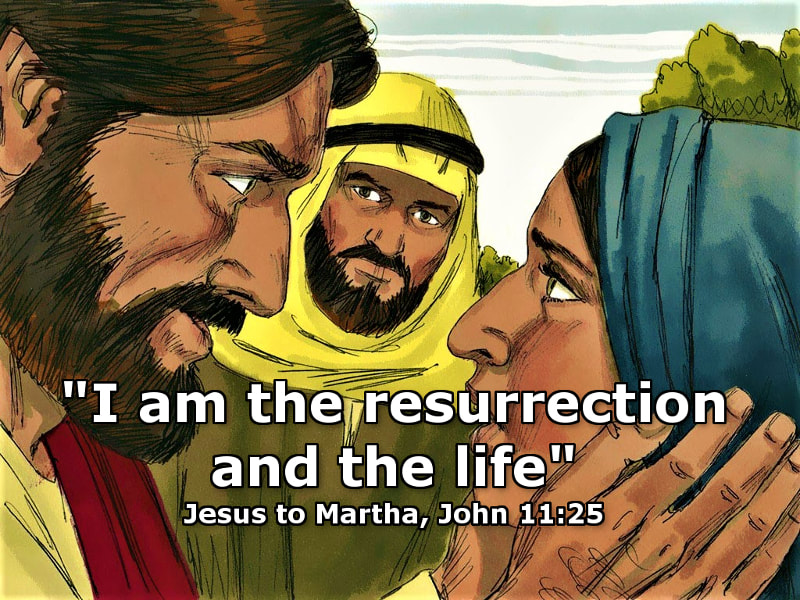
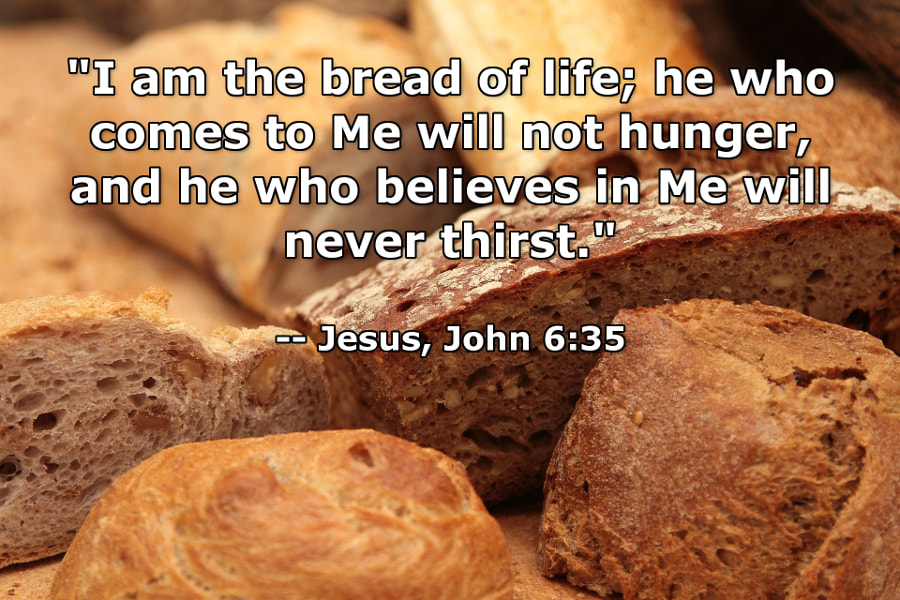
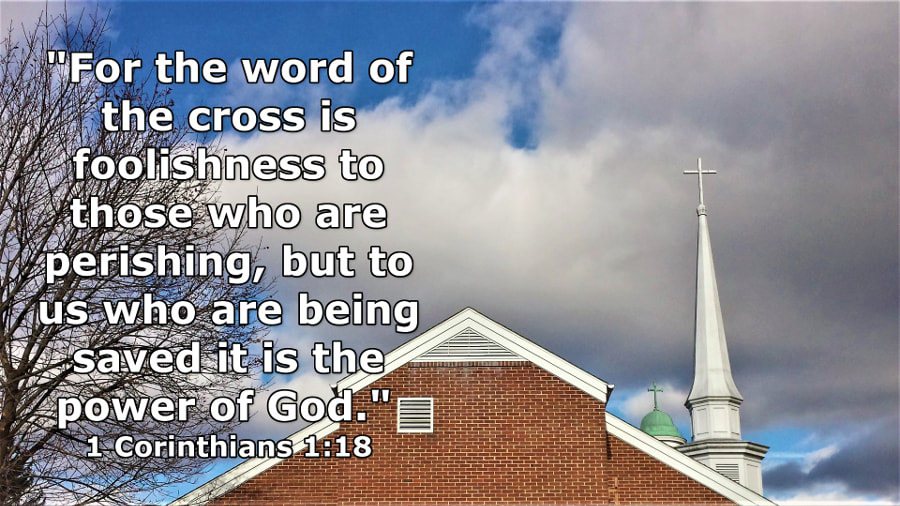

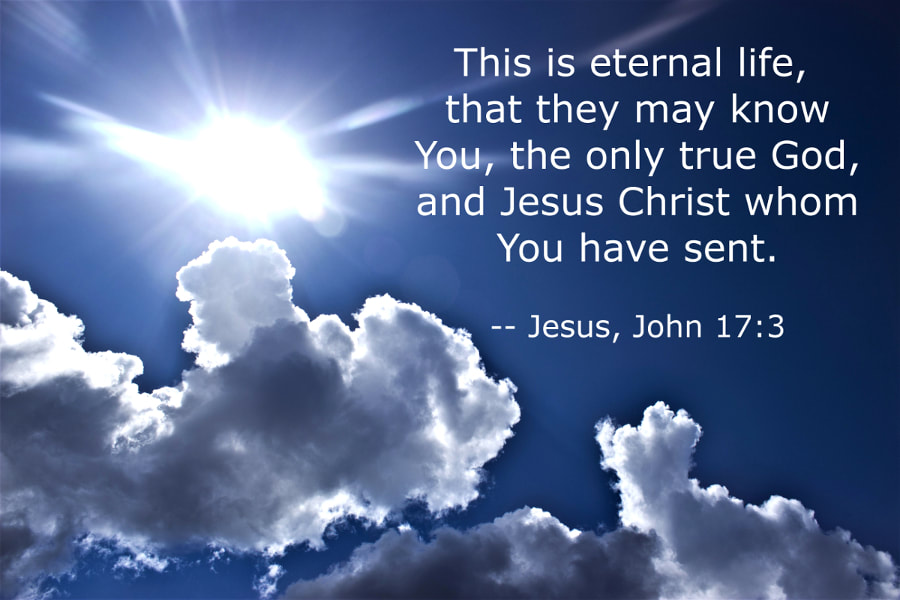
 RSS Feed
RSS Feed
